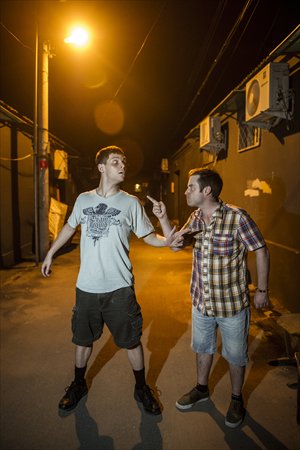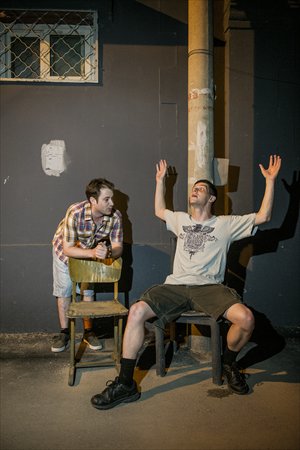HOME >> METRO BEIJING
Crosstalk crossover
By Jonny Clement Brown Source:Global Times Published: 2013-7-8 18:23:01

Jesse Appell and Nick Angiers make up the first-ever English-language crosstalking duo. Crosstalk, or xiangsheng, is a Chinese bantering form of comedy. Photo: Li Hao/GT
The first guy is tall and wiry. The second, slightly shorter and thicker set.
On stage together, Jesse Appell and Nick Angiers physically resemble a classic, Laurel and Hardy type of comedy duo. Everything about their performance last Wednesday for a weekly open mic night at Hot Cat Club in Fangjia Hutong seemed unconventional.
They don't use vocal amplification; everyone else uses a microphone. There are two performers; others go solo. Their set is about 13 minutes long; open mic rules stipulate a maximum of five minutes on stage. They don't swear or use vulgarity; others do, and in abundance.
"We're going to do something very special tonight, an English version of xiangsheng," declares Angiers from the stage through the hullabaloo of the audience.
The traditional Chinese comedic form of dialogue xiangsheng, or crosstalk, differs greatly from the other comedy acts appearing on stage that night, usually imitating the styles of Western comics.
A couple of enthusiastic whistles and a groan from the back ring out. This is certainly not what the crowd's expecting.
"Yep. That's right," says Appell confidently. He then focuses on the size of Angiers's head, claiming it to be the source of his cleverness as a xiangsheng performer.
"I look at your head and think wouldn't it be great if I could just take your head and rip it open and take out the brain to figure out how you do what you do," he says theatrically.
Before any of the largely expatriate funny boned fans in attendance know better, the crosstalking duo are up and away into the world of xiangsheng performance - a slightly strange bantering style of comedy that is light in tone and delivery, at times even slightly surreal.
"Wait. What does my brain have to do with anything?" Angiers replies in jest as their conversation begins to ramble. There's a loud groan from an audience member again. But there are smatterings of laughter, too.

Emcee of the night at Hot Cat Club, Niko Martinez, doubts English crosstalk's appeal to foreigners.

Angiers (left) and Appell (right) goof around in a hutong after their first English xiangsheng performance. Photos: Li Hao/GT
A different kind of laughter
Traditionally, xiangsheng is a whimsical Chinese comedy act in the form of a conversation between two performers. Suggestive and rich in puns, crosstalk is executed in a quick-fire, teasing manner.
Today, xiangsheng remains a traditional art form with little direct or serious satire toward politics, instead incorporating topics dealing with daily life, such as skits about McDonald's or KFC, for example.
If your Chinese language skills have graduated to the point where you can understand the distinctive sound of crosstalk gushing out of a Beijing cabbie's radio, then you might have concluded that xiangsheng is the comedy version of tantric sex; there isn't always a punch line to finish up a joke and the emphasis is instead on the setup to those punch lines.
"When people see xiangsheng for the first time, they say, 'Oh this is like Chinese standup, right? Then why aren't there a lot of punch lines?'" says Fulbright Scholar Appell, 22, a Brandeis University alumnus hailing from Boston.
Appell has focused his grant on learning Chinese culture through the performance art of xiangsheng, famously mastered by fellow North American Mark Rowswell, aka Dashan, a prominent celebrity in China after numerous CCTV Spring Festival Gala appearances starting in the late 1990s.
Dashan found xiangsheng's closest English equivalent to be Abbott and Costello's 1930s baseball wordplay masterpiece "Who's On First." The basic premise is that Costello enquires of Abbott who is on first base, to which Abbott replies, "Who is on first base," as if there was a person called Who. Get it? What is playing second base and I Don't Know is on third. Comical misunderstandings ensue, and so it goes with xiangsheng.
"It's a different kind of laughter," says Angiers, 31, originally from Vancouver, Canada, who has been under the tutelage of famous crosstalk master and teacher Ding Guangquan for four years. With a goofy laugh, Angiers says that delivering xiangsheng in English shouldn't be a problem for people who don't know any Chinese or who aren't even in China.
"It should be clean and there should be culture in it and it should be funny," he says. "That's basically it. We want them to find it both interesting and funny."
Appell feels that in theory at least, the style of crosstalk performance shouldn't be too difficult to deliver in English "in terms of the actual performance aspect of it."
"It's very understandable [for the audience] to have two guys on stage doing their bit," continues Appell, who also studies under the guidance of Ding.
With Appell and Angiers, audience members don't need to have a masterful command of the Chinese language to understand the nuances of crosstalk dynamics. Though the pair still has some creases to iron out in their act.
Obstacles of prejudice
Immediately after their debut as English-speaking trailblazers, both slipped out into a quiet alley and analyzed how their set went down. Judging from the audiences' reaction, their biggest obstacle might be that xiangsheng humor is too much of a throwback to a bygone era of more innocent comic sensibilities bereft of vulgarity - something Western audiences have come to view as standard from their wise-cracking comedians.
Appell is clearly frustrated.
"That's the thing about expectations," he says. "[The audience] had come to see Western-style stand-up."
Angiers makes a distinction and offers that they successfully performed the sketch but says the way they did it wasn't entirely successful.
"I think that people picked up on what we were doing," Appell says. "I think they enjoyed it. But we need to take it to the next level and do what the real xiangsheng artists do, which is that every single line will have a physicality, body motion and emotion."
Crossover potential
Levi Woodward, 31, a Portland, Oregon, native, accountant and novice comedian, watched Appell and Angiers from the side of the stage immediately after his amusing five-minute stand-up routine about life in China. He wasn't exactly sure what he was watching at first.
"I thought it was really cool. Xiangsheng is really new to me but they got all the Chinese people laughing which is really hard to do," says Woodward.
As a comedian who has been a part of the China Comedy Club scene based around Hot Cat Club for about a year, Woodward has noticed that if you say the wrong thing about China, Chinese audience members won't find it funny.
But Woodward hypothesizes that every time the nascent comedy scene in Beijing diversifies, it gets better, and xiangsheng in English does exactly that.
"They made both [Chinese and foreigners] laugh," he says. "Finding the middle ground is the hardest thing to do."
Yang Yang, a 27-year-old fixed-gear bike shop employee in Beijing, was impressed with her first-time viewing of an English version of her beloved xiangsheng. "I can't express how good they were," she says. "It's a very difficult thing to do."
As Appell and Angiers left the stage to a lukewarm reception (there was a sense that the performance had gone on a bit too long), host Niko Martinez, sarcastically paid tribute: "Ladies and gentlemen put your hands together for Jesse and the other guy!"
"I didn't get it. I didn't understand it," Martinez later says to Metropolitan over the phone. "I was confused, man."
Asked if he was aware that this was a debut of sorts for xiangsheng in English, Martinez replied mockingly, "Wow! That's awesome," then hung up the receiver to board a train.
Posted in: Metro Beijing